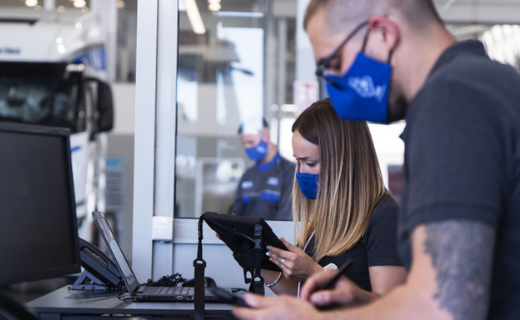CAR tech
The 5 trends that will transform the role of workshops from 2022
Equipo CAR · 29/11/2021

The pandemic has been a turning point in the way of relating not only in the personal sphere: the paradigm shift within companies is evident -videoconferences, telework-, and has ended up affecting the company-customer binomial with new needs and demands that until now did not exist.
Nos enfrentamos a un momento lleno de cambios… y oportunidades.
We are facing a time full of change… and opportunity. The automotive industry is no stranger to this new situation. In addition to this change in the relationship, in which the customer wants to prefer a remote service that does not force him to repeatedly go to the workshop, there are a number of factors that are where the future goes: changes in the business model, concentration and new demands, among others.
All those businesses that want to guarantee their survival and prosper in the future must take measures, from adapting workspaces to reaffirming their commitment to staff training through the digitization of their management.
Consumption habits that are changing the future of repair shops
New trends influence the processes when it comes to bringing in new customers, inspecting the vehicle and the repair service itself.
Among theseautomotive trends, five stand out that will be part of modern industry:
- 1. Increase in the useful life of the fleet
There is a very marked pattern of a few years to this part, and that is that the vehicles that are manufactured today are more reliable than ever: mileage increases until clutch, distribution or oil and filters begin to need repairs.
This has two very marked consequences: the volume of purchase of first-hand vehicles is affected, since their use is extended over time, but at the same time the workshops benefit because repairs are increased. In this sense, the after-sales sector will close 2021 with an increase of 9.7% compared to 2020 -12,726 million euros compared to 11,097 in 2020.
- 2. Changes in the business model
Renting and new forms of mobility threaten to change the traditional business model of dealerships and brands: has skyrocketed by 37.14% compared to the same period in 2020, and TNC services (Uber, Cabify, etc.) continue to grow.
Although they currently only account for one percent of the vehicles in operation, these modelsride-hailing are expected to grow rapidly and affect how people get around.
With regard to the workshops, this change of habit will have as great beneficiaries those networks that remain with the maintenance service of the rental companies, as well as the fleets of TNCs.
- 3. Reduced demand for spare parts
Industry experts say that components produced today are of higher quality and last longer, so the need to repair a car and the demand for aftermarket parts are projected to decline.
In workshops this has a primary consequence: an increase in profit margins derived from being able to work in advance, and having automated stock management. On the contrary, not having an exhaustive control or a medium-term planning will make the workshop less competitive with respect to the competition.
- 4. The grouping together of companies
Gerardo Pérez, president of Faconauto, said in one of his last speeches to the media that the automobile market tends towards companies becoming part of a network:«One of the most positive characteristics of the dealer network in Spain is grouping together”, explained in the presentation of a study carried out by MSI.explained in the presentation of a study carried out by MSI..
“I don’t think points of sale are going to disappear because that closeness to the customer is needed. In fact, there are companies evaluating locations that had ceased to be attractive during the crisis and are now being of interest again”, said Gerardo.
- 5. Digitization, increased automation and electrification
The takeoff in the sales of next-generation vehicles does not go unnoticed. Models that include new components that force workshops to update their technology in order to offer adequate maintenance and repair services.
The owners of these vehicles will look for workshops and dealers capable of solving their demands, not only on a technological level, but also that they have professionals trained to do so. Is your company ready for the change?
Thefuture of machine shops
Faced with this scenario, the future of mechanical workshops is promising, although not without its challenges.
Multi-brand dealerships, and similarly the smaller ones, must have the capacity to offer the same services as official dealerships: the user looks for technologically advanced professionals, who have the right parts and, in addition, maintain the personalized treatment.
In this context, in which, on the other hand, the sale of models older than ten years exceeds the registration of new vehicles by 30%, workshops must be proactive when investing in tools, equipment and technology and guarantee continuous training of staff to be competitive.
Innovationgoes through CAR
Talking about the future of mechanical workshops means talking about CAR. All the management of your business improved thanks to a digital layer that is applied on the tools that you already use in the company. It includes:
- Digitization of the entire service cycle.
- Mobility inside and outside the workshop.
- Professional and corporate image.
- Greater productivity in each service.
- Efficiency in the digital interrelation of data and statistics.
Try our demo and join the future.